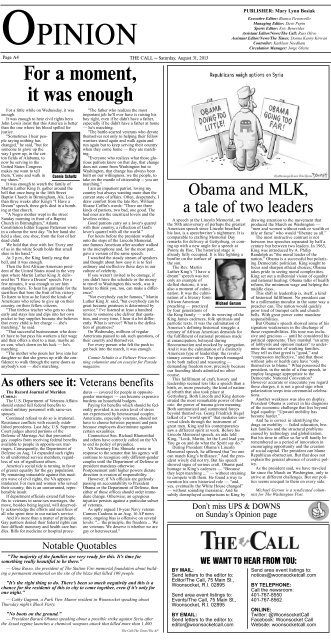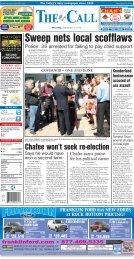After bash, city looks forward - The Woonsocket Call
After bash, city looks forward - The Woonsocket Call
After bash, city looks forward - The Woonsocket Call
You also want an ePaper? Increase the reach of your titles
YUMPU automatically turns print PDFs into web optimized ePapers that Google loves.
OPINION<br />
PUBLISHER: Mary Lynn Bosiak<br />
Executive Editor: Bianca Pavoncello<br />
Managing Editor: Dave Pepin<br />
Sports Editor: Eric Benevides<br />
Assistant Editor/News/<strong>The</strong> <strong>Call</strong>: Russ Olivo<br />
Assistant Editor/News/<strong>The</strong> Times: Donna Kenny Kirwan<br />
Controller: Kathleen Needham<br />
Circulation Manager: Jorge Olarte<br />
Page A4<br />
THE CALL — Saturday, August 31, 2013<br />
For a moment,<br />
it was enough<br />
For a little while on Wednesday, it was<br />
enough.<br />
It was enough to hear civil rights hero<br />
John Lewis insist that this America is better<br />
than the one where his blood spilled for<br />
justice.<br />
"Sometimes I hear people<br />
saying nothing has<br />
changed," he said, "but for<br />
someone to grow up the<br />
way I grew up, in the cotton<br />
fields of Alabama, to<br />
now be serving in the<br />
United States Congress<br />
makes me want to tell<br />
them, 'Come and walk in Connie Schultz<br />
my shoes.'"<br />
It was enough to watch the family of<br />
Martin Luther King Jr. gather around the<br />
bell that once hung in the 16th Street<br />
Baptist Church in Birmingham, Ala. Less<br />
than three weeks after King's "I Have a<br />
Dream" speech, three girls died in a bombing<br />
at that church.<br />
"A Negro mother wept in the street<br />
Sunday morning in front of a Baptist<br />
Church in Birmingham," Atlanta<br />
Constitution Editor Eugene Patterson wrote<br />
in a column the next day. "In her hand she<br />
held a shoe, one shoe, from the foot of her<br />
dead child.<br />
We hold that shoe with her. Every one<br />
of us in the white South holds that small<br />
shoe in his hand."<br />
At 3 p.m., the King family rang that<br />
bell, and it was enough.<br />
<strong>The</strong>n the first African-American president<br />
of the United States stood in the very<br />
spot where Martin Luther King Jr. delivered<br />
his "I Have a Dream" speech. For a<br />
few minutes, it was enough to see him<br />
standing there. To hear his gratitude for the<br />
sacrifices that bore the fruit of his victory.<br />
To listen to him as he listed the kinds of<br />
Americans who refuse to give up on their<br />
country, on their fellow citizens.<br />
"That tireless teacher who gets to class<br />
early and stays late and dips into her own<br />
pocket to buy supplies because she believes<br />
that every child is her charge — she's<br />
marching," he said.<br />
"That successful businessman who doesn't<br />
have to but pays his workers a fair wage<br />
and then offers a shot to a man, maybe an<br />
ex-con, who's down on his luck — he's<br />
marching.<br />
"<strong>The</strong> mother who pours her love into her<br />
daughter so that she grows up with the confidence<br />
to walk through the same doors as<br />
anybody's son — she's marching.<br />
"<strong>The</strong> father who realizes the most<br />
important job he'll ever have is raising his<br />
boy right, even if he didn't have a father,<br />
especially if he didn't have a father at home<br />
— he's marching.<br />
"<strong>The</strong> battle-scarred veterans who devote<br />
themselves not only to helping their fellow<br />
warriors stand again and walk again and<br />
run again but to keep serving their country<br />
when they come home — they are marching.<br />
"Everyone who realizes what those glorious<br />
patriots knew on that day, that change<br />
does not come from Washington but to<br />
Washington, that change has always been<br />
built on our willingness, we the people, to<br />
take on the mantle of citizenship -- you are<br />
marching."<br />
I am an impatient patriot, loving my<br />
country but always wanting more than the<br />
current state of affairs. Often, desperately, I<br />
draw comfort from the late Rev. William<br />
Sloane Coffin's words: "<strong>The</strong>re are three<br />
kinds of patriots, two bad, one good. <strong>The</strong><br />
bad ones are the uncritical lovers and the<br />
loveless critics.<br />
Good patriots carry on a lover's quarrel<br />
with their country, a reflection of God's<br />
lover's quarrel with all the world."<br />
For hours before the president walked<br />
onto the steps of the Lincoln Memorial,<br />
one famous American after another walked<br />
to the microphone and, for the most part,<br />
gave a version of the same speech.<br />
I watched the steady stream of speakers<br />
and thought about how easy it is to feel<br />
ordinary and ineffective these days in our<br />
culture of celebrity.<br />
If you weren't invited to be onstage, if<br />
you didn't have the schedule or the money<br />
to travel to Washington this week, was it<br />
harder to think you, too, can make a difference?<br />
"Not everybody can be famous," Martin<br />
Luther King Jr. said, "but everybody can be<br />
great because greatness is determined by<br />
service." I've listened at least a hundred<br />
times to someone else deliver that quotation,<br />
and every time, I hear it a bit differently.<br />
What is service? What is the definition<br />
of greatness?<br />
On Wednesday, millions of regular<br />
Americans paused to ask such questions, of<br />
their country and themselves.<br />
For every person who felt the push to<br />
get back into the march, it was enough.<br />
Connie Schultz is a Pulitzer Prize-winning<br />
columnist and an essayist for Parade<br />
magazine.<br />
As others see it: Veterans benefits<br />
Notable Quotables<br />
<strong>The</strong> Record Journal of Meriden<br />
(Conn.):<br />
<strong>The</strong> U.S. Department of Veterans Affairs<br />
should extend full federal benefits to<br />
retired military personnel with same-sex<br />
spouses.<br />
Continued refusal to do so is irrational.<br />
Resistance conflicts with recently established<br />
precedents. Last July, U.S. Supreme<br />
Court judges altered portions of the<br />
Defense of Marriage Act that prevented<br />
gay couples from receiving federal benefits<br />
available to people in opposite-sex marriages.<br />
Consequently, the Department of<br />
Defense on Aug. 14 expanded such rights<br />
to all uniformed service members, regardless<br />
of sex of significant others.<br />
America's social tide is turning in favor<br />
of greater equality for the gay population.<br />
By remaining intractable against this modern<br />
wave of civil rights, the VA appears<br />
intolerant. For men and women who served<br />
their country, this is an unwarranted, reprehensible<br />
insult.<br />
If department officials extend full benefits<br />
to veterans in same-sex marriages, the<br />
move, besides being logical, will deservedly<br />
acknowledge the efforts and sacrifices of<br />
all who spent time in our nation's service.<br />
And it's more than a matter of principle.<br />
Gay partners denied their federal rights can<br />
face difficult monetary and health care hurdles.<br />
Bills for medicine or hospital procedures<br />
— covered for people in oppositegender<br />
marriages — can become expensive<br />
burdens on household budgets.<br />
Paying for benefits which should be federally<br />
provided is an extra level of stress<br />
not experienced by heterosexual couples.<br />
Americans, especially veterans, should not<br />
have to choose between payment and pain<br />
because employers discriminate against<br />
certain sexualities.<br />
Connecticut Sen. Richard Blumenthal<br />
and others have correctly called on the VA<br />
to end its policy of prejudice.<br />
VA Secretary Eric Shinseki wrote in<br />
response to the senator that his agency will<br />
continue to recognize only different-gender<br />
couples until the Department of Defense or<br />
president mandates otherwise.<br />
Postponement until higher powers dictate<br />
direction is evasion of responsibility.<br />
However, if VA officials are gutlessly<br />
passing on accountability to President<br />
Obama or the Department of Defense, then<br />
either of those offices should order immediate<br />
change. Otherwise, an egregious<br />
injustice persists against a particular subset<br />
of veterans.<br />
As aptly argued 18-year Navy veteran<br />
Carmen Cardona in an Aug. 16 AP news<br />
story, ongoing bias is offensive on several<br />
levels: "... the principle, the freedom ... We<br />
are veterans. We deserve it whether we are<br />
gay or heterosexual."<br />
"<strong>The</strong> majority of the families are very ready for this. It's time for<br />
something really beautiful to be there."<br />
— Gina Russo, the president of <strong>The</strong> Station Fire memorial foundation about building<br />
a permanent memorial on the site of the blaze that killed 100 people.<br />
"It’s the right thing to do. <strong>The</strong>re’s been so much negativity and this is a<br />
chance for the residents of this to <strong>city</strong> to come together, even if it’s only for<br />
one night."<br />
— Cathy Gagnon, a Park View Manor resident in <strong>Woonsocket</strong> speaking about<br />
Thursday night’s Block Party.<br />
"No boots on the ground.”<br />
— President Barack Obama speaking about a possible strike against Syria after<br />
the Assad regime launches a chemical weapons attack that killed more than 1,400.<br />
<strong>The</strong> <strong>Call</strong>/<strong>The</strong> Times/<strong>The</strong> AP<br />
Obama and MLK,<br />
a tale of two leaders<br />
A speech at the Lincoln Memorial, on<br />
the 50th anniversary of perhaps the greatest<br />
American speech since Lincoln breathed<br />
his last, is a speechwriter’s nightmare. It is<br />
comparable to crafting Memorial Day<br />
remarks for delivery at Gettysburg, or coming<br />
up with a new angle for a speech at<br />
Pointe du Hoc. <strong>The</strong> historical stage is<br />
already fully occupied. It is like lighting a<br />
bonfire on the surface of<br />
the sun.<br />
<strong>The</strong> Rev. Martin<br />
Luther King’s “I have a<br />
dream” speech was not<br />
only an example of<br />
skilled rhetoric; it was<br />
also a moment of culmination.<br />
It was the culmination<br />
of a literary form:<br />
Michael Gerson<br />
African American<br />
preaching — practiced<br />
by four generations of<br />
the King family — with its weaving of the<br />
King James cadences, folk spirituals and<br />
patriotic texts. It was the culmination of<br />
America’s defining historical struggle: a<br />
century of African American demands for<br />
the fulfillment of national promises made<br />
at emancipation, betrayed during<br />
Reconstruction and mocked by segregation.<br />
And it was the culmination of a distinctly<br />
American type of leadership: the revolutionary<br />
conservative. <strong>The</strong> speech managed<br />
to be both radical and reassuring —<br />
demanding freedom now, precisely because<br />
our founding ideals admitted no other<br />
course.<br />
This fulfillment of craft, history and<br />
leadership seemed less like a speech than a<br />
birth, or, more precisely, the kind of national<br />
rebirth that also took place at<br />
Gettysburg. Both Lincoln and King demonstrated<br />
the most remarkable power of rhetoric:<br />
the power of trauma given meaning.<br />
Both summarized and summoned forces<br />
beyond themselves. Georg Friedrich Hegel<br />
talked of a “world spirit” that mediates universal<br />
ideals through the instrument of<br />
great men. King and his contemporaries<br />
saw a different spirit at work. Before his<br />
Lincoln Memorial speech, an aide told<br />
King, “Look, Martin, let the Lord lead you.<br />
You go on and do what the Spirit say do.”<br />
During President Obama’s Lincoln<br />
Memorial speech, he affirmed that “no one<br />
can match King’s brilliance.” And the president<br />
wisely did not try. But his speech<br />
showed signs of serious craft. Obama paid<br />
homage to King’s cadences — “Because<br />
they kept marching ...” — without straining<br />
to compete with them. He found a way to<br />
mention his own historical role — “and,<br />
yes, eventually the White House changed”<br />
— without sounding messianic. And he<br />
subtly downplayed comparisons to King by<br />
Don’t miss UPS & DOWNS<br />
on Sunday’s Opinion page<br />
drawing attention to the movement that<br />
produced the March on Washington —<br />
“men and women without rank or wealth or<br />
title or fame” who would “liberate us all.”<br />
<strong>The</strong> most instructive contrast is not<br />
between two speeches separated by half a<br />
century but between two leaders. In 1963,<br />
King was introduced by A. Philip<br />
Randolph as “the moral leader of the<br />
nation.” Obama is a successful but polarizing<br />
Democratic politician. King sought to<br />
focus and sharpen ethical choices; Obama<br />
takes pride in seeing moral complexities.<br />
King set out a millennial vision of equality<br />
and national healing; Obama talks of health<br />
reform, the minimum wage and helping the<br />
middle class.<br />
This shift in leadership is, itself, a kind<br />
of historical fulfillment. No president can<br />
be a millenarian moralist in the same way a<br />
preacher can. <strong>The</strong> nation would quickly<br />
grow tired of trumpet calls and church<br />
bells. With great power come mundane<br />
responsibilities.<br />
But Obama’s speech showed some of his<br />
signature weaknesses in the discharge of<br />
those responsibilities. His tone was inclusive<br />
and gracious — until he considered his<br />
political opponents. <strong>The</strong>y marshal “an army<br />
of lobbyists and opinion makers” to undermine<br />
the interests of working families.<br />
<strong>The</strong>y tell us that greed is “good,” and<br />
“compassion ineffective,” and that those<br />
without jobs or health care have “only<br />
themselves to blame.” What possessed the<br />
president, in the midst of a fine speech, to<br />
employ language appropriate to the<br />
Democratic National Convention?<br />
However accurate or inaccurate you regard<br />
these charges, it is not a good sign when<br />
polarization seeps into ceremonial celebrations.<br />
Another weakness was also on display.<br />
President Obama is correct in his diagnosis<br />
of the economic challenge that lies beyond<br />
legal equality: “Upward mobility has<br />
become harder.”<br />
And he is correct in identifying the<br />
drags on mobility — failed education, broken<br />
families and the structural problems<br />
caused by technology and globalization.<br />
But his time in office so far will hardly be<br />
remembered as a period of innovation in<br />
encouraging opportunity and the creation<br />
of social capital. <strong>The</strong> president can blame<br />
Republican obstruction. But that does not<br />
explain the general absence of creative policy.<br />
As the president said, we have traveled<br />
far since the March on Washington, only to<br />
arrive at different challenges. But our politics<br />
seems unequal to them on every side.<br />
Michael Gerson is a syndicated columnist<br />
for <strong>The</strong> Washington Post.<br />
WE WANT TO HEAR FROM YOU:<br />
BY MAIL:<br />
Send letters to the editor to:<br />
Editor/<strong>The</strong> <strong>Call</strong>, 75 Main St.,<br />
<strong>Woonsocket</strong>, R.I. 02895<br />
Send area event listings to:<br />
Events/<strong>The</strong> <strong>Call</strong>, 75 Main St.,<br />
<strong>Woonsocket</strong>, R.I. 02895<br />
BY EMAIL:<br />
Send letters to the editor to:<br />
editor@woonsocketcall.com<br />
Send area event listings to:<br />
notices@woonsocketcall.com<br />
BY TELEPHONE:<br />
<strong>Call</strong> the newsroom:<br />
401-767-8550<br />
401-767-8562<br />
ONLINE:<br />
Twitter: @<strong>Woonsocket</strong><strong>Call</strong><br />
Facebook: <strong>Woonsocket</strong> <strong>Call</strong><br />
Website: woonsocketcall.com




